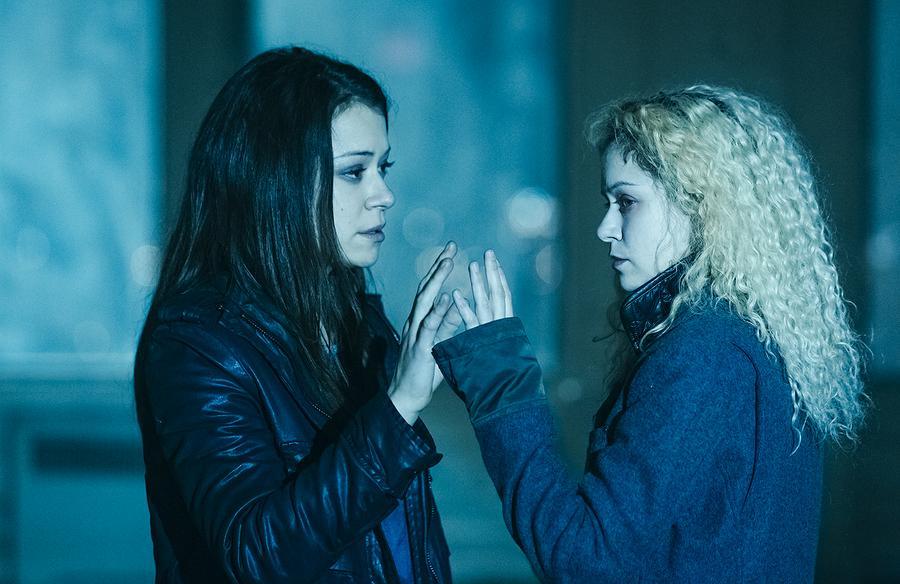This year’s Emmy nominations sent the Twitterverse into a frenzy. Critics, fans and casual viewers alike were abuzz about the nomination in the Outstanding Lead Actress in a Drama Series category of a relative newcomer to the television scene: Tatiana Maslany. After two years of being overlooked, Maslany finally got the recognition that fans — like myself — believe she deserves.
Maslany stars in BBC America’s “Orphan Black,” a critically acclaimed series going into its fourth season next summer. Since its premiere in 2013, the show has only gotten better and looks to continue its upward climb.
“Orphan Black” tells the story of Sarah Manning (Tatiana Maslany), a British orphan who assumes the identity of lawyer Beth Childs, a stranger who looks identical to her, after witnessing her kill herself in a chance encounter.
Sarah soon discovers that both she and Beth are not just doppelgangers but clones, and she has “sisters” spread throughout the world. Beth, she realizes, knew this already and had already tracked down many of the other clones.
Throughout the series’ three seasons, Sarah meets Allison Hendrix (Tatiana Maslany), a high-strung, stereotypical soccer mom with a wild streak; Cosima Niehaus (Tatiana Maslany), a quirky Ph.D. student in Experimental Evolutionary Development Biology; Helena (Tatiana Maslany), Sarah’s psychotic, estranged identical twin; and Rachel Duncan (Tatiana Maslany), a ruthless corporate powerhouse who was raised self-aware.
Notice a pattern?
When I first saw the trailer for “Orphan Black,” I did not register the fact that Maslany was playing every character I saw until the very end. That’s how incredible her performance was, and the trailer was only 30 seconds long.
Maslany steals every scene she is in, no matter which clone she is portraying. Every time she switches roles, her entire persona alters: her body language, her accent, even the way she breathes. It is a nearly indescribable phenomenon, watching Maslany act out a raw and emotional scene alongside, well, herself. According to an interview in The New York Times, Maslany manages to memorize her lines by recording dialogue on GarageBand and running lines with the recordings as each different character.
The clones themselves are all brilliantly characterized. Sarah brings a gritty energy to the show, Allison provides much-needed comedic relief, and Cosima’s quirky compassion brings the group together. The best scenes are when all of Maslany’s characters are together; the clones’ relationships are beautifully fleshed out and portrayed.
Additional credit must be given, of course, to the talented supporting cast alongside Maslany. Jordan Gavaris gives a hilarious and wonderfully entertaining performance as Felix Dawkins, Sarah’s flamboyant foster brother. Dylan Bruce is also a menacing and fascinating presence on the small screen as Paul Dierden, the mysteriously motivated boyfriend of deceased Beth who develops an attachment to Sarah.
“Orphan Black” puts particular emphasis on the science element of science fiction. Its mythology is built on the biology of the clones, some of which have “defects” or “mutations.” Sarah, for example, is able to have children, while the other clones are sterile. Cosima, meanwhile, suffers from a mysterious ailment that has taken the lives of her other “sisters” (who aren’t active characters in the show). The science is integral to the plot, acting as a driving force rather than a distraction.
The science is also as sound as fictional science can be. The real-life inspiration for Cosima’s character, Cosima Herter, a Ph.D. student herself on the history of biotechnology in the 20th century, serves as a consultant on the show.
“Orphan Black” also provides a refreshing portrayal of LGBTQ characters. Cosima, who happens to be lesbian, is not a caricature meant to represent the lesbian population. She is a character who just so happens to be gay. “My sexuality,” she says in a season two episode, “is not the most interesting thing about me.” She is a full and developed character who is completely comfortable with who she is, the kind of representation lacking in television today.
For all its special effects, plot twists and complex mythology, “Orphan Black” remains popular because of its heart. Each of the clones has her own story, her own struggles and her own soul. You can connect to Sarah’s desperation to keep her ragtag family safe, feel Allison’s desperation to have a picture-perfect life in the suburbs, see Cosima’s determination to be in command of her own body and biology. The cast’s love for their craft bleeds into their sincere performances, enhanced by the wonderful scripts, making every new episode a worthy hour of television.
I highly recommend “Orphan Black” for anyone looking for something strange and exciting. Fair warning: it’s the kind of show that will suck you into its clutches and never let you go, but it’s a worthwhile captivity.
Season four of “Orphan Black” will premiere in 2016 on BBC America and previous seasons are available for streaming on Netflix.








